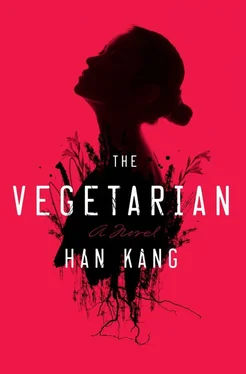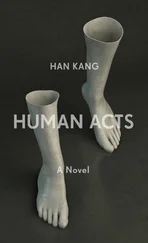The only times when the pain simply, miraculously ceases, are those moments just after she laughs. Something Ji-woo says or does makes her laugh, and then immediately afterward she is left blank, empty even of pain. At such times, the sheer fact of her having laughed seems unbelievable, and makes her laugh again. Admittedly, this laughter always seems more manic than happy, but Ji-woo loves to see it all the same.
“Was this it, Mum? Was this what made you laugh?”
Then Ji-woo will repeat whatever it is he’d just been doing, such as pursing his lips and using his hands to mimic a horn growing out of his forehead, or else making a clattering sound, sticking his head between his legs and calling out “Mum, Mum!” in a silly voice. The more she laughs, the more he ups the ante with his clowning. By the time he finishes he will have run through all the secret mysteries of laughter that human beings have ever understood, mobilizing everything at his disposal. There is no way for him to know how guilty it makes his mother feel, seeing such a young child go to such lengths just to wring a bit of apparent happiness from her, or that her laughter will all eventually run out.
Life is such a strange thing, she thinks, once she has stopped laughing. Even after certain things have happened to them, no matter how awful the experience, people still go on eating and drinking, going to the toilet and washing themselves — living, in other words. And sometimes they even laugh out loud. And they probably have these same thoughts, too, and when they do it must make them cheerlessly recall all the sadness they’d briefly managed to forget.
But lying next to the small, tanned body of her son, after sleep draws itself down over his guiltless young face, the night begins again for her. A time when there is neither sight nor sound of any other living thing. As long as eternity, as bottomless as a swamp. If she curls up in the empty bathtub and closes her eyes, the dark woods close in around her. The dark lines of rain drill into Yeong-hye’s body like spears, her skinny bare feet are covered in mud. When In-hye shakes her head to dispel the image, summer trees in broad daylight flicker in front of her eyes like huge green fireworks. Is this because of the hallucination Yeong-hye told her about? The innumerable trees she’s seen over the course of all her life, the undulating forests that blanket the continents like a heartless sea, envelop her exhausted body and lift her up. Only fragments of cities, small towns and roads are visible, floating on the roof of the forest like islands or bridges, slowly being swept away somewhere, borne on those warm waves.
There’s no way for In-hye to know what on earth those waves are saying. Or what those trees she’d seen at the end of the narrow mountain path, clustered together like green flames in the early-morning half-light, had been saying.
Whatever it was, there had been no warmth in it. Whatever the words were, they hadn’t been words of comfort, words that would help her pick herself up. Instead, they were merciless, and the trees that had spoken them were a frighteningly chill form of life. Even when she turned about on the spot and searched in all directions, In-hye hadn’t been able to find a tree that would take her life from her. Some of the trees had refused to accept her. They’d just stood there, stubborn and solemn yet alive as animals, bearing up the weight of their own massive bodies.
—
Time passes.
In-hye puts the lids back on all of the containers. She packs everything up into her bag, starting with the thermos. She zips the bag closed.
What other dimension might Yeong-hye’s soul have passed into, having shrugged off flesh like a snake shedding its skin? In-hye recalled how Yeong-hye had looked when she’d been standing on her hands. Had Yeong-hye mistaken the hospital’s concrete floor for the soft earth of the woods? Had her body metamorphosed into a sturdy trunk, with white roots sprouting from her hands and clutching the black soil? Had her legs stretched high up into the air while her arms extended all the way down to the earth’s very core, her back stretched taut to support this two-pronged spurt of growth? As the sun’s rays soaked down through Yeong-hye’s body, had the water that was saturating the soil been drawn up through her cells, eventually to bloom from her crotch as flowers? When Yeong-hye had balanced upside down and stretched out every fiber in her body, had these things been awakened in her soul?
“But seriously,” In-hye said out loud. “What the hell?”
“You’re dying,” she said, louder this time. “You’re lying there in that bed, and dying. Nothing else.” She presses her lips tightly together, clenching her teeth so savagely the blood shows through, wrestling with the desire to get hold of Yeong-hye’s insensible face, to shake her wraithlike body hard and hurl her back down on the bed.
—
Now there’s no more time left.
In-hye shoulders her bag and pushes back the chair. Walking with a stoop, she hurries out of the ward. When she turns her head, Yeong-hye’s body is still rigid and unmoving beneath the sheet. In-hye clenches her teeth even harder. She walks along to the lobby.
—
A nurse with bobbed hair walks up to the table in the lobby carrying a small white plastic basket, and sits down. In the basket are various nail clippers. The patients line up and each in turn is given a pair of clippers. Each selection takes a long time, as if the patients are trying to decide which pair will suit them best. On the other side of the lobby, a ponytailed nurse’s aide cuts the nails of the dementia sufferers.
In-hye stands quietly and observes the scene. Anything sharp or narrow that could be used to pierce or cut, anything with a long cord that could be wrapped around a throat, is forbidden. Partly this is to prevent the patients from harming others, but the main concern is that they would want to harm themselves. In-hye scans their faces, each of them bent over their hands, absorbed in the task of getting their nails cut before their time with the clippers is up. The clock on the wall indicates five minutes past two.
A doctor’s white coat flits by the glass door, and the entrance to the lobby opens. It is Yeong-hye’s doctor. He turns and locks the door behind him, his movements swift and practiced. No doubt the same could be said at any large hospital, but here, at a psychiatric hospital, the authority of the medical specialist seems even more pronounced. Perhaps it is because the patients here are not free to leave. They flock around the doctor as though they have just discovered their Messiah.
“Just a minute, doctor. Did you call my wife? If you could just tell her that’s it okay for me to be discharged…here’s my wife’s number. If you’d just give her a call…”
“Doctor, please change my medication. There’s this incessant…ringing sound in my ears.”
“Doctor, won’t you speak to him? He’s always hitting me, I can’t cope anymore. What, now you’re at it too? Why are you kicking me? I’m telling you to talk to me.”
The doctor gives the woman a relaxed, direct smile, clearly designed to appease.
“When did I kick you? Now hang on, I need you all to talk to me one at a time. When did this ringing in the ears start?” The woman stamps her foot loudly, impatient at having to wait, the feelings contorting her face seeming more like misery and anxiety than violent inclinations.
Just then the door to the lobby opens again and another doctor comes in, one that In-hye hasn’t seen before.
“That’s the internist,” Hee-joo says. In-hye hadn’t noticed her arrive. Apparently each psychiatric institution has an internist permanently on hand. This man seems young, though perhaps he just has a young-looking face, and gives the impression of being intelligent but cold. Eventually, Yeong-hye’s doctor detaches himself from the gaggle of patients and strides over to In-hye. She takes a step back without realizing it.
Читать дальше












